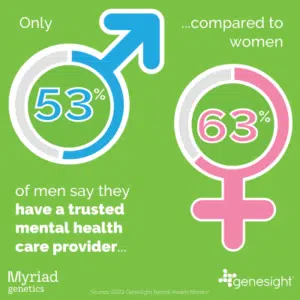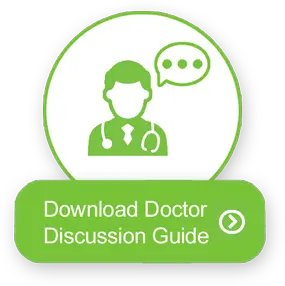“Being a man, there’s all sorts of stigmas about mental health and not asking for help. Men may be expected to take life with blunt force, full on by yourself. I struggled with that for a long time. You can’t just magically toughen up your brain. If something’s wrong, something’s wrong. It’s about letting go of your ego and realizing that it’s not your fault – that you can’t do it yourself.”
– Dylan Eyestone, a GeneSight patient from Indiana
Only 53% of men say they have a trusted mental health care provider, significantly less than the 63% of women who say they have a trusted provider, according to the GeneSight Mental Health Monitor, a nationwide survey from Myriad Genetics, Inc. (NASDAQ: MYGN).
“It took personal courage and support from those close to me to seek out help,” said Ryan Griggs, PhD, medical science liaison with Myriad Genetics. “As a rugby player, I tried ‘manning up’ and ‘toughing it out’ for years after I lost my dad, but that clearly wasn’t the answer. Mental health treatment helped me and is likely a better option for other men – or for anyone who is struggling.”
For those men with a trusted mental healthcare provider, the benefits are startling:
“These survey results show that it is important for men to take care of their mental health,” said Dr. Griggs.
The risk of not taking care of mental health
The study confirms what mental health professionals like Dawn Johnson, psychiatric mental health nurse practitioner at the Indiana Center for Recovery, have witnessed in their male clients.
“A lot of times, men have this persona of the tough guy and ‘I can just tough out the situation,’” she said. “It takes a little bit longer for them to let their guard down enough to go into the pain that they’re holding inside and the grief that they’ve not worked through.”
A significant number of men admit to “heavily” engaging in a variety of unhealthy coping mechanisms(1), from taking stimulant drugs to gambling, drinking or using social media:
“For many people, drug and alcohol problems begin as self-medication: using substances to cope with temporary stress or to manage symptoms of chronic mental health problems they may not even know they have,” wrote Nora D. Volkow, M.D., director of the National Institute on Drug Abuse (NIDA), in a blog on the NIDA website. “Substance use, particularly alcohol, can be a socially accepted way of dealing with negative emotions.”
Indiana resident Dylan Eyestone believes he may have had mental health problems when he was younger, but the symptoms were missed – and, therefore, not treated. In high school, he began hanging with “the wrong crowd,” he said. “Senior year, that’s when I started smoking weed and just started screwing off.”
At the same time, Eyestone started experiencing suicidal thoughts and major mood swings.
“Some days I would be fine, and I could sleep three hours and have the best day ever, but other days I would want to do nothing but sleep and just lay in bed and do nothing,” Eyestone said. In addition to marijuana, he and his friends would sometimes try party drugs like mushrooms and MDMA.
It wasn’t until Eyestone was an adult that he was diagnosed with ADHD and eventually bipolar disorder. But that was only after his problems landed him in jail. His mother said that he could live with her on one condition: he sought help at a mental health and addiction treatment center. That’s how Eyestone ended up at the Indiana Center for Recovery and met Dawn Johnson.
Shortly into his stay at the Indiana Center for Recovery, Eyestone heard about the GeneSight Psychotropic test from other patients.

That’s when the light bulb went off for Eyestone. When he was younger, he was placed on a variety of ADHD medications that never seemed to work.
“No wonder I felt like crap when I was on them as a kid,” he said.
The GeneSight test analyzes how your genes may affect your outcomes with medications commonly prescribed to treat depression, anxiety, ADHD and other mental health conditions. The GeneSight Psychotropic test provides your clinician with information about which medications may require dose adjustments, may be less likely to work for you, or may have an increased risk of side effects based on your genetic makeup.
Eyestone felt relieved when he learned about the GeneSight test. “It’s not just going to be throwing darts in the dark” anymore when treating his diagnosis, he said.
Mental health treatment may be help fight addiction crisis
“Treating mental illnesses like depression, anxiety, post-traumatic stress disorder, ADHD, and others with medications or other therapies is crucial to address the addiction and overdose crisis that now claims over 100,000 lives annually,” Dr. Volkow wrote.
An article from The Pew Charitable Trust’s substance use prevention and treatment initiative affirms Dr. Volkow’s commentary.
“Getting access to effective care is the first step toward recovery, and medication-assisted treatment has proven to be the gold standard for helping people with an SUD (Substance Use Disorder) achieve successful outcomes. With a focus on interventions, such as trauma-informed care, that address both mental health issues and substance use disorders, health professionals can better address the complex nature of drug misuse among men and reduce the risk of overdose.”
Brighter days – and helping other men
After getting mental health and addiction treatment – as well as taking medication that helps him – Eyestone says he now experiences brighter days.
“My mood swings went from going like this (big waves) to just little, tiny waves that are manageable, not overwhelming with emotion,” he said.
He added that trying to work things out on your own, which men typically do, isn’t a good solution. Through his recovery program, he realized there were better ways to help himself than using “blunt force” and battling life alone.
“I can actually talk to people and get help from others, and see that other people have the same experience – it’s not just me,” he said. “And that was the turning point when I realized I’m not struggling alone here.”
Johnson confirmed Eyestone’s experience of what can happen when a man opens up to other people and seeks appropriate treatment. “It takes a lot more bravery and a lot more courage to actually let those walls down and be vulnerable enough to work through some of these things,” she said.
For more information about similar topics, please visit:
- Read more about the GeneSight Mental Health Monitor
- Watch Dawn Johnson and other addiction treatment clinicians talk about the link between addiction and mental health in our GeneSight Cares discussion
- Sign up for our Brighter Days Challenge
(1) Categories include:
- Drinking – Socially or alone
- Marijuana – Smoking or edibles
- Drug use – Sedatives, stimulants, hallucinogens, anesthetics, or inhalants (not including marijuana)
- Excessive gambling – Sports or non-sports
- Binge/restrictive food, sleeping, or exercise
- Digital – excessive social media or video gaming
- Entertainment – Binging TV or movies
- Clubbing/partying
Our articles are for informational purposes only and are reviewed by our Medical Information team, which includes PharmDs, MDs, and PhDs. Do not make any changes to your current medications or dosing without consulting your healthcare provider.
The GeneSight test must be ordered by and used only in consultation with a healthcare provider who can prescribe medications. As with all genetic tests, the GeneSight test results have limitations and do not constitute medical advice. The test results are designed to be just one part of a larger, complete patient assessment, which would include proper diagnosis and consideration of your medical history, other medications you may be taking, your family history, and other factors.
If you are a healthcare provider and interested in learning more about the GeneSight test, please contact us at 855.891.9415. If you are a patient, please talk with your doctor to see if the GeneSight test may be helpful.











